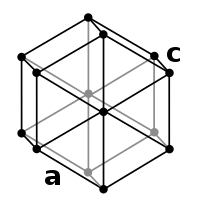
Photo from wikipedia
Abstract In this study, we propose a new methodology for lithium hydride electrolysis which can be extended for the extraction of hydrogen isotopes from molten lithium. This new process utilizes… Click to show full abstract
Abstract In this study, we propose a new methodology for lithium hydride electrolysis which can be extended for the extraction of hydrogen isotopes from molten lithium. This new process utilizes a ceramic lithium ion conductor that can be directly immersed in molten lithium to facilitate the electrochemical extraction of hydrogen isotopes in the molten state. The extraction of hydrogen isotopes from lithium is necessary for the safe and reliable operation of fusion reactors that utilize molten metals as a coolant and/or as tritium breeder blanket in the system. A number of technologies for hydrogen isotope extraction from molten lithium have been proposed that can facilitate the extraction of hydrogen isotopes. However, they require a series of complicated mechanical steps (expensive mechanical parts with limited lifetimes) in order to carry out the separation and prevent impurities build up in the extraction process. Our proposed electrochemical process can potentially simplify the isotope extraction process by eliminating many of the mechanical parts and being able to integrate this technology within the fusion reactor to perform the extraction in-line. To determine the feasibility of this process, a proof of concept was demonstrated experimentally utilizing a solid state lithium ion conductor to facilitate the electrochemical extraction of hydrogen and deuterium from lithium in the molten state. The extraction of hydrogen and deuterium from molten lithium was verified during this experiment and indicates this new process is a potential alternative for other processes used for the extraction of hydrogen isotopes. Process modeling was also performed to understand the energy requirements and electrode areas needed for decomposing different concentrations of tritium.
Journal Title: Fusion Engineering and Design
Year Published: 2019
Link to full text (if available)
Share on Social Media: Sign Up to like & get
recommendations!